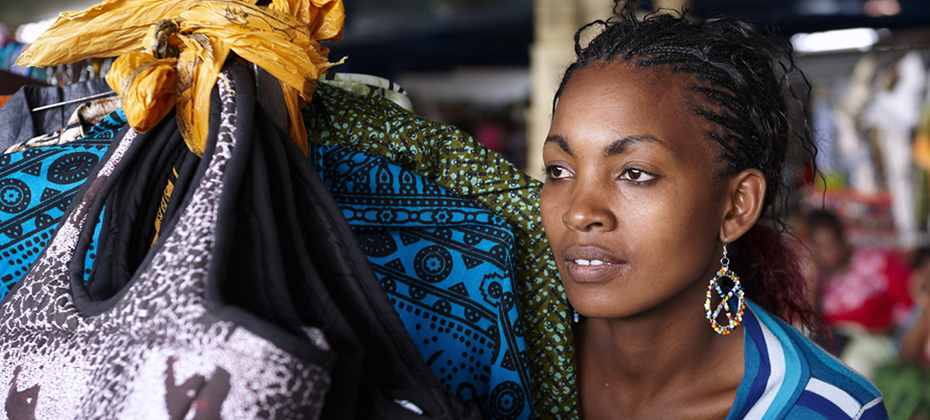Experian Stories
The #ExperianStories series features ways our innovative employees from around the world are improving our world.

I’m a Senior Product Strategy Manager in Experian’s Consumer Services department. I help banks connect people to the loans and credit cards they need, but my role is always changing because the world around us is changing. My team and I noticed how a whole generation is now thinking differently from other generations about the way they work and live. Rather than joining a large corporation, they make a living through a variety of platforms, like Uber, Airbnb and others — stringing together multiple jobs to make their income on their own timetable. The challenge for these people comes when they go to a bank to take out a loan, apply for a credit card or try to finance a car. The banks have difficultly gauging their risk or creditworthiness because they don’t have a traditional income source or because their credit footprint is difficult to trace. Banks refer to those types of individuals as “credit invisibles.” That’s where my team and I come in. We brainstorm ideas and create concepts for Experian to implement that will enable us to aggregate data from alternative sources — like utility bills or phone bills — to give banks a more accurate, robust view of each individual. Additionally, we create useful tools that help people manage their multiple income streams to ensure they’re able to meet their financial obligations each month. As the wealth of data in the world continues to grow, I see myself as an innovator who turns data into utility that works for people. I am constantly dreaming up new ways to connect banks with people who need a loan to feed their family, send their kids to college or buy a car for work. I want to help people take the guesswork out of taking each of life’s biggest steps. I want to empower them — through their data — to realize their dreams. Read more #ExperianStories from our colleagues around the world.

I’m a Regional Sales Strategy Director for Experian in France. While Experian provides grants for entrepreneurs, we are always looking for ways to support new businesses beyond financial support. I had discovered an avenue for employees to volunteer as coaches to train budding entrepreneurs, so I brought the opportunity to Experian’s attention. Eight colleagues and I ended up bringing together entrepreneurs from the Ainée Business Incubator and a charity supporting young entrepreneurs from low-income areas in Paris for a day-long workshop in our Experian Paris office. The workshop was focused on helping entrepreneurs build elevator pitches, digital marketing plans and data protection strategies. I was running the elevator pitch session when I met an entrepreneur named Jocelyne. She wanted to set up a business importing Jamaican fruit and vegetables to the top restaurants in Paris. During the session, I coached Jocelyne and her peers through the basics of an elevator pitch, giving them opportunities to practice together in pairs before presenting to the group. Jocelyne had never given a pitch before, but she did an amazing job. She decided to pretend she was pitching Alain Ducasse – one of the big three Michelin star chefs in Paris. She talked as though he was in the room, which brought her pitch to life. She made her business sound so tasty, I was hungry myself by the end. Jocelyne had been quiet at the start of the workshop, but after giving that pitch, you could see this fresh sense of confidence in her as a new light came into her eyes. By helping one entrepreneur in Paris nail her business pitch, I got to help inspire a small amount of confidence to help Jocelyne turn her business dream into a reality. It was amazing and touching to see that kind of transformation. Read more #ExperianStories from our colleagues around the world.

I’m the Head of Utilities in Experian’s Energy and Water Sector. I handle a very specialized form of fraud called “energy theft,” where an individual or business steals electricity by tapping a line or bypassing the energy meter. Back in 2010, the process for handling this type of fraud was broken. Few companies bothered investigating instances of theft; they just accepted the pervasive issue as a cost of sale. This fraudulent activity was costing energy consumers approximately £30 per year, while putting countless homes and offices at risk, since faulty wiring for gas and electricity often leads to house fires or even explosions. Energy regulators decided the time had come for energy providers to crack down on the practice. My team and I at Experian were invited to a consultation to discuss how to use data and innovative techniques to end energy theft. The model we suggested was adopted as the preferred approach, and in the last year the project has been implemented across the entire industry in the UK. Our model combines data from the big energy companies with Experian’s own database to identify which residential or business properties may be stealing energy from the network. We can determine this by comparing energy consumption trends with information on how many people actually occupy the property. With both data sets, we can determine the amount of energy we believe the property should be consuming. If the energy consumption is lower than it should be on a particular piece of property, we look at fraud and credit data sets to see if the case qualifies as a genuine instance of low consumption (such as an older woman living alone), or if someone is perpetrating theft. We send that information back to the supplier so they can prioritize it for investigation. Through this program, I’ve helped protect countless homes and saved consumers from having to pay for energy they’re not using. I love that what I do not only gives me the opportunity to be creative in how I use data, but also helps protect businesses and everyday people. Read more #ExperianStories from our colleagues around the world.

I’m the Product Manager of Brazil’s Limpa Nome Online Recovery Portal, which was developed to help people manage and clear their debts. In Brazil, if you have debts, you are said to have a “nome sujo.” Literally translated, this means a “dirty name” — and that means good financial standing and access to credit are nearly impossible. My colleague and I met a Brazilian named Fabio who had a “nome sujo.” We sat down with him one afternoon to learn more about his situation. He told us he had built up debt with a national bank over six months. The debt was so unmanageable, he said, he was almost to the point where he could no longer pay it back. Fabio also told us how he spent at least four hours commuting to and from work each day, which limited his time outside of work. The thought of spending the limited time he had at a bank or collection agency trying to convince them to negotiate with the lender on his behalf seemed impossible. Understandingly, Fabio was enduring many sleepless nights. He tried searching on Google for help and came across Limpa Nome from Serasa Experian. He enrolled on our website, where he could view the debt he owed to the lender as well as proposals to make a settlement of dispute with the bank. Because Fabio had made a settlement proposal through Experian’s Limpa Nome website, the bank made an exception for him, allowing him to pay R$70 instead of R$1,000 each month until his debt was paid off. Within 10 minutes, Fabio’s problems were solved and his name was once again a “limpa nome” — a clear name. Our tool helped remove his financial burden and enabled him to have good credit to now be able to buy a house or a car. Using Experian’s Limpa Nome Online Recovery Portal, my team and I are using data to help give people like Fabio the tools to re-establish a good financial standing so they can pursue their dreams. Read more #ExperianStories from our colleagues around the world.

I’m an Experian Health Training Manager. I get to meet with healthcare organizations and teach them how to use our Financial Assistance Screening tool, which helps them easily and cost-effectively determine which patients qualify for financial assistance. I didn’t expect to interact directly with patients as part of my job, but I did – and the experience moved me. Recently, a client started using our automated tool, so I went to Colorado to train their financial counselors on how the product worked and help them understand the data so they could begin to use the tool with their patients. But then I was asked if I wanted to see the tool in action. Nothing could have prepared me for the experience of interacting directly with a patient who benefited from this tool – a woman who seemed visibly shaken when the financial counselor and I first met her in one of our client’s medical centers. After the financial counselor explained why we were there, she began to work her way down a list of questions prompted by Experian’s tool, asking about the patient’s annual income, household size and disabilities. After two minutes of questioning, the counselor hit “save” on the responses, and immediately the results came up on the screen. “Good news – you qualify for a 100 percent discount through our Medical Financial Assistance program,” the counselor said. “Your medications, stay and follow-up visits will all be covered.” The patient had trouble processing this information at first. “Are you telling me that now I can focus on getting better, and I don’t have to think about my medical bills?” This realization brought her to tears of relief. Her time in the waiting room had been plagued with thoughts of how she couldn’t afford her hospital stay, despite how much she needed medical attention. With our help, those thoughts were put to rest. With Experian’s tool, patients like this woman no longer need documents to prove their annual income. And healthcare providers don’t need to manually calculate whether and how they can provide financial support. After our meeting with this patient, the financial counselor told me she was so moved she was shaking. “It is inspiring to so tangibly be able to help our patients,” she said. I agree. I’m glad that through data, I’m helping healthcare organizations give patients financial peace of mind when they need it most. Read more #ExperianStories from our colleagues around the world.

I lead Experian’s EMEA Procurement team, where I work with Experian’s offices around the world when they begin implementing new projects or product ideas. I was recently asked to work alongside Experian’s Consumer Business in the United Kingdom as they prepared to launch Experian’s CreditExpert companion app. They wanted to enable consumers to access their credit reports on a mobile device, while also being able to access personalized tips on how to improve credit scores. The part of this project that I found most critical, however, was the app’s built-in web monitoring tool that proactively protects consumers’ online identities from fraud. Protection of personal data is a hot topic in the big data industry. As my team and I worked through the challenges associated with protecting our customers from identity theft and fraud, we brought in experts from other Experian functions — like our security team — to assess the tools we were using and help us put proper measures and protocols in place that would enable us to protect consumers using the app. With the launch of this new app, we can catch cases of fraud the moment they occur. So, if someone steals an individual’s information to take out a loan or a mortgage in their name, we send out an alert right away to the affected individual, encouraging them to log on to the application to review their account activities. If fraud has occurred, the app takes the hassle out of the equation for consumers. Our team will investigate the incident on their behalf. I am proud to work for a company that continuously develops new products and services to help consumers better understand their credit and to keep their financial futures and identities safe. Read more #ExperianStories from our colleagues around the world.

Portuguese Translation I’m a Marketing Analyst in Serasa Experian’s Data Strategy and Management department. While my day job is to help businesses create user-friendly digital experiences online, the role I’m most passionate about is a project I’m implementing that will use interactive games to help people take better control of their finances. Earlier this year, I learned about One Young World – a summit in Ottawa, Canada where delegates from around the world share solutions for pressing global issues, including financial education. To be selected as one of five ambassadors to this event from Experian, I had to pitch a project idea that would provide financial education to Brazilian citizens. My idea was to transform Experian’s existing educational website and mobile app into a game, to make financial education more interactive and engaging. I envisioned incentivizing customers to better understand their finances by offering them product discounts in exchange for high scores in games. Each game would teach people different skills on how to control their finances – like budgeting – or improve their credit score. Experian loved the idea so much that they not only selected me as one of their ambassadors for One Young World, but also chose to implement the idea for our customers. Within the next 12 months, my project will be implemented, providing financial education to countless Brazilian men and women who are struggling to clear their debts and manage their budgets. I attended the One Young World summit in the fall, which furthered my desire to continuously provide better financial education for the people in my country. I want everyone to feel empowered when they think about their finances. It’s important for people to be able to recover their dignity and clear their name if they had a poor credit background. And I’m happy to do my part to give people better access to the credit they need to improve their lives and the lives of their families. Read more #ExperianStories from our colleagues around the world.

I’m an Account Executive in Experian’s Consumer Information Services department. I’m also a millennial. So I know firsthand that millennials’ way of thinking — and spending — typically goes against the grain of traditional lending, especially given today’s focus on a sharing economy. Most millennials don’t have a traditional credit history to prove we can be trusted to pay back loans or lines of credit from lenders. Using data, I’m working to change that while also helping small businesses by enabling them to do business with my generation. At Experian, we look at alternative data sets — like paying rent and utilities — that show how a millennial is actually a low-risk candidate for credit, even if his or her credit score doesn’t reflect that. Through our data, we’re providing opportunities for people who wouldn’t ordinarily have access so they can buy their first house, get a car or start that business they’ve always dreamed about. I see my role as a bridge between millennials and an older generation, connecting young consumers with the resources experienced lenders can provide. A lot of my clients are small-business lenders with strict underwriting criteria. My lenders need to improve their underwriting to win lifelong customers, but they’re understandably afraid of risk. With pinpoint accuracy, we can help them identify their best opportunities using data, including information like rent payments, they may have overlooked. In my work, I get to take a hands-on approach of adapting to an emerging market and an ever-evolving technology landscape. I’m proud to be helping to create a new generation of customers for small businesses while giving my fellow millennials the financial access they need. Read more #ExperianStories from our colleagues around the world.

At Experian MicroAnalytics, we work to develop the financial services sector in emerging economies. We knew when we started this venture that we wanted to make a big difference and have a strong social impact. Recently, we began working with one of the largest banks in Kenya – a country where a lot of people don’t have access to finance. Getting a loan can take weeks, requiring an enormous amount of paperwork. For all that effort, most Kenyan entrepreneurs really only need $5 to $120 loans to help their family pay for groceries or purchase fresh business supplies. If a Kenyan small-business owner, for example, needs to pay their supplier $50 for Coca-Cola products to sell in their shop at a higher margin, they have no easy or timely way to get that money, which means they lose potential business. We implemented for this bank in Kenya a system that allows their clients to log onto a mobile banking app and get their loan instantly. This system creates a risk profile for each client, collecting all the relevant data on any previous banking transaction. The system – using the risk profile – will then define the maximum amount the bank can lend to each individual client, and any loan request within this limit is processed and disbursed into the client’s bank account instantly. This system enables them to cut through the red tape and piles of paperwork, giving more people access to affordable loans. Since we started, we have helped more banks in countries around the world facing the same types of issues. It feels great to know that the work we’re doing is helping millions of people get access to finance. It means they can pay for whatever they need in an easy way, allowing them to make ends meet and keep their business moving. Read more #ExperianStories from our colleagues around the world.